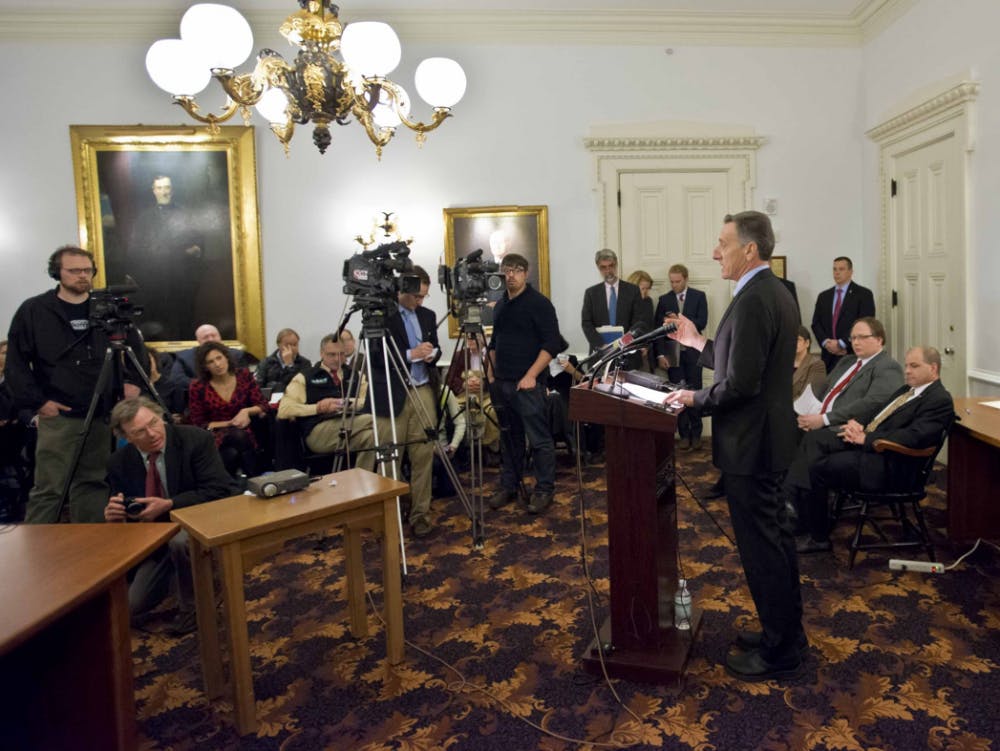On Dec. 17th, Governor Peter Shumlin announced that he was terminating his four-year quest to begin single-payer, government-run health care for residents of Vermont. In his press conference, Shumlin emphasized the economic risks that would have accompanied the single-payer plan.
“The cost of that plan turned out to be enormous, requiring an 11.5 percent payroll tax on all Vermont businesses and a public premium assessment of up to 9.5 percent of individual Vermonters’ income,” Shumlin wrote in his blog. “Further, the phase-in for smaller businesses and those that do not currently offer insurance would add an additional $500 million to the system. These are tax rates that I cannot responsibly support or urge the Legislature to pass. In my judgment, the potential economic disruption and risks would be too great to small businesses, working families and the state’s economy.”
Vermont has been involved in a long search for affordable health care. In 2010, the state established a commission to study different forms of health care the state could implement. Single-payer was chosen as the best option. In 2011, the Vermont state government passed H 202, which established Green Mountain Care. Green Mountain Care was a step towards universal health care for Vermonters. The Green Mountain Care Board was created in the same year to oversee Green Mountain Care’s design, and to make sure that it remained a health care system that could serve the needs of every Vermonter.
The state had expected to get $150 million in federal help to put the Green Mountain Care system in place and an additional $150 million in Medicaid assistance.
Single-payer health care involves the government paying as an insurer for all health care costs, rather than private insurers. Unlike single-payer health care systems in countries such as Canada or the UK, private insurers in Vermont could still operate, and even offer general health care.
The decision to try single-payer was a controversial one, and many argued from the beginning that a single-payer system would never work. Four days after Shumlin’s decision to end the program, Forbes published an article titled “Six Reasons Why Vermont’s Single-Payer Health Plan Was Doomed From the Start.” Scott Milne, Shumlin’s close opponent in the gubernatorial election, called for abandoning single-payer early on in the election season.
However, the decision to stop the single-payer program has been highly protested. On Thursday, Dec. 18, approximately 80 protestors gathered on the steps of the Statehouse for a demonstration in favor of single-payer health care. The protestors chanted slogans berating Shumlin, such as “which side are you on, Shumlin?” Several demonstrators burned their medical bills. After the rally, the demonstrators delivered a tray of burnt toast to Shumlin’s office with a note that said, “Dear Shumlin, your career is toast.”
On Jan. 8, more protesters rallied against the demolition of the single-payer system for Vermont, and later sat on the floor of the House and refused to leave. 29 of these protestors were arrested when police tried to close the building at 8 p.m. that night. Nine out of the 29 were charged with resisting arrest.
The Vermont Workers’ Center has played a crucial role in organizing the protests, and started a campaign called “Healthcare is a Human Right” in 2008. According to its website, “Since 2008, the Healthcare Is a Human Right Campaign has been organizing to make universal healthcare a reality in Vermont. In 2011, our people’s movement succeeded in getting a groundbreaking law passed: Act 48, which commits Vermont to creating a healthcare system providing healthcare as a public good and ensuring everyone can get the healthcare they need, when they need it.”
The campaign members argue that if Vermont can successfully implement publicly financed universal healthcare, other states will follow suit.
An open letter titled “Now is the Time for Green Mountain Care,” which urges the government and legislature to stand by Act 48 and the creation of a publicly financed healthcare system under Green Mountain Care, has been signed by over 60 organizations, including Amnesty International.
“I know this is a huge disappointment to many Vermonters,” said Shumlin on his blog. “I know because I am one of those Vermonters who has fought for this to succeed. While the time is not right today, we must not give up on health care reform. We are doing transformational things in Vermont when it comes to the way we deliver health care.”
Some critics claim that Shumlin’s timing in announcing his decision to drop single-payer efforts was politically motivated. However, Shumlin’s staff insists that he did not have the complete financial analysis on single-payer’s tax increases until after the Nov. 4th election. Shumlin failed to win the majority of votes in the general election, and was only voted in as governor by the Vermont Legislature on Jan 8.
Shumlin has not given up hope for healthcare reform in Vermont, but believes that pushing for single-payer system now, when the state is not yet ready, will jeopardize its future.
“Those reforms can and must continue,” he wrote on his blog, “and our success will lay the groundwork for future efforts to implement a publicly-financed health care system. While now is not the right time for Vermont to take such a step, the time will come.”
Shumlin Ends Bid for Single-Payer

Comments



